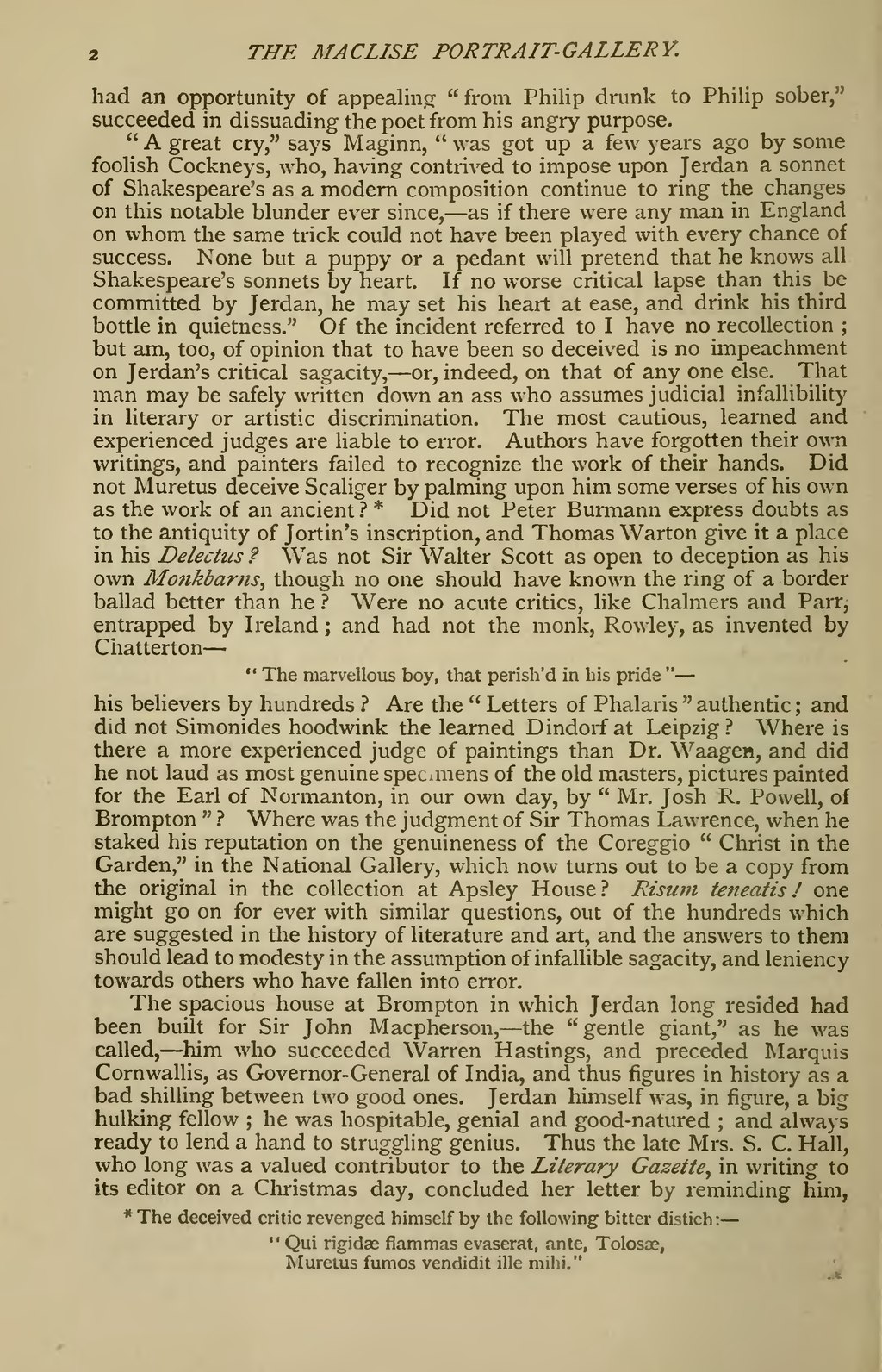had an opportunity of appealing "from Philip drunk to Philip sober," succeeded in dissuading the poet from his angry purpose.
"A great cry," says Maginn, "was got up a few years ago by some foolish Cockneys, who, having contrived to impose upon Jerdan a sonnet of Shakespeare's as a modern composition continue to ring the changes on this notable blunder ever since,—as if there were any man in England on whom the same trick could not have been played with every chance of success. None but a puppy or a pedant will pretend that he knows all Shakespeare's sonnets by heart. If no worse critical lapse than this be committed by Jerdan, he may set his heart at ease, and drink his third bottle in quietness." Of the incident referred to I have no recollection; but am, too, of opinion that to have been so deceived is no impeachment on Jerdan's critical sagacity,—or, indeed, on that of any one else. That man may be safely written down an ass who assumes judicial infallibility in literary or artistic discrimination. The most cautious, learned and experienced judges are liable to error. Authors have forgotten their own writings, and painters failed to recognize the work of their hands. Did not Muretus deceive Scaliger by palming upon him some verses of his own as the work of an ancient?[1] Did not Peter Burmann express doubts as to the antiquity of Jortin's inscription, and Thomas Warton give it a place in his Delectus? Was not Sir Walter Scott as open to deception as his own Monkbarns, though no one should have known the ring of a border ballad better than he? Were no acute critics, like Chalmers and Parr, entrapped by Ireland; and had not the monk, Rowley, as invented by Chatterton—
"The marvellous boy, that perish'd in his pride"—
his believers by hundreds? Are the "Letters of Phalaris" authentic; and did not Simonides hoodwink the learned Dindorf at Leipzig? Where is there a more experienced judge of paintings than Dr. Waagen, and did he not laud as most genuine specimens of the old masters, pictures painted for the Earl of Normanton, in our own day, by "Mr. Josh R. Powell, of Brompton"? Where was the judgment of Sir Thomas Lawrence, when he staked his reputation on the genuineness of the Coreggio "Christ in the Garden," in the National Gallery, which now turns out to be a copy from the original in the collection at Apsley House? Risum teneatis! one might go on for ever with similar questions, out of the hundreds which are suggested in the history of literature and art, and the answers to them should lead to modesty in the assumption of infallible sagacity, and leniency towards others who have fallen into error.
The spacious house at Brompton in which Jerdan long resided had been built for Sir John Macpherson,—the "gentle giant," as he was called,—him who succeeded Warren Hastings, and preceded Marquis Cornwallis, as Governor-General of India, and thus figures in history as a bad shilling between two good ones. Jerdan himself was, in figure, a big hulking fellow; he was hospitable, genial and good-natured; and always ready to lend a hand to struggling genius. Thus the late Mrs. S. C. Hall, who long was a valued contributor to the Literary Gazette, in writing to its editor on a Christmas day, concluded her letter by reminding him,
- ↑ The deceived critic revenged himself by the following bitter distich:—
"Qui rigidæ flammas evaserat, ante, Tolosæ,
Muretus fumos vendidit ille mihi."
